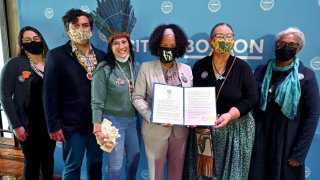
The second Monday in October, celebrated for years as Columbus Day, will be recognized as Indigenous Peoples Day in Boston starting this year, Mayor Kim Janey has announced.
It's an effort to recognize and celebrate the Massachusett Tribe, who lived where Boston now stands before colonizers arrived, as well as the neighboring Wampanoag and Nipmuc tribes.
"Observing Indigenous Peoples Day is about replacing the colonial myths passed down from generation to generation with the true history of the land upon which our nation was founded," Janey said in a statement Wednesday, after signing an executive order at City Hall.
While the announcement didn't say whether the date would continue to be recognized as Columbus Day -- which is a state holiday -- going forward, in the order, Janey says, "I encourage the city of Boston to observe Indigenous Peoples Day in lieu of Columbus Day by reflecting upon the dispossession of the homeland of the Massachusett Tribe."
An administration official said the city's holiday calendar, which refers to Monday as Columbus Day, would be updated to read Indigenous Peoples Day.
Some cities across Massachusetts and the country have begun to move away from honoring Christopher Columbus, whose exploitation of native people in what became known as the Americas was long skipped over in discussions about his exploration -- his expedition spotted what they considered the New World on Oct. 12, 1492.
Members of the Massachusett Tribe, as well as the United American Indians of New England and the North American Indian Center of Boston were part of the order's signing Wednesday.
"For far too long, the indigenous history of this place has been obscured, and frequently erased, by the histories, myths, and priorities of the dominant culture," said Elizabeth Solomon of the Massachusett Tribe at Ponkapoag in a statement. "We are happy to see the City of Boston take the important step of recognizing and celebrating Indigenous peoples in Boston, the Americas, and around the world."
She and other leaders thanked the Janey administration for recognizing the day.
Kimimilasha James, an Aquinnah Wampanoag youth leader in United American Indians of New England, noted that the move "is just a first step for the city to begin to build relationships with Indigenous people and begin to address the many injustices faced by Indigenous people here in Boston and elsewhere."
The announcement noted that a group of city employees has put together proposals on more ways to help the community heal, including land acknowledgement and expanding the city's capacity to engage with and support the indigenous community.

